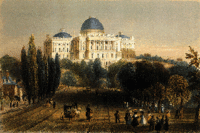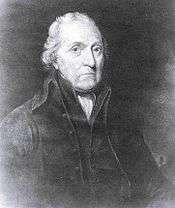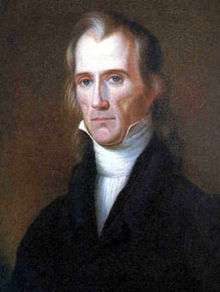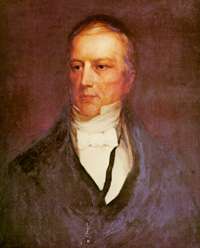22nd United States Congress
| 22nd United States Congress | |||||||||||||||||||||||||||||
| |||||||||||||||||||||||||||||
The Twenty-second United States Congress was a meeting of the legislative branch of the United States federal government, consisting of the United States Senate and the United States House of Representatives. It met in Washington, D.C. from March 4, 1831 to March 4, 1833, during the third and fourth years of Andrew Jackson's presidency. The apportionment of seats in the House of Representatives was based on the Fourth Census of the United States in 1820. Both chambers had a Jacksonian majority.
Major events
- December 28, 1832: Vice President John C. Calhoun resigned. The first Vice President of the United States to do so.
- Nullification Crisis
Major legislation
- July 14, 1832: Tariff of 1832, ch. 227, 4 Stat. 583
- March 2, 1833: Tariff of 1833 (Compromise Tariff), ch. 55, 4 Stat. 629
- March 2, 1833: Force Bill, ch. 57, 4 Stat. 632
Party summary
The count below identifies party affiliations at the beginning of the first session of this congress. Changes resulting from subsequent replacements are shown below in the "Changes in membership" section.
Senate
| Party (shading shows control) |
Total | Vacant | |||
|---|---|---|---|---|---|
| Anti- Jacksonian (Anti-J) |
Jacksonian (J) | Nullifier (N) | |||
| End of the previous congress | 22 | 25 | 0 | 47 | 1 |
| Begin | 20 | 24 | 2 | 46 | 2 |
| End | 23 | 23 | 1 | 47 | 1 |
| Final voting share | 48.9% | 48.9% | 2.1% | ||
| Beginning of the next congress | 25 | 20 | 1 | 46 | 2 |
House of Representatives
| Party (shading shows control) |
Total | Vacant | ||||
|---|---|---|---|---|---|---|
| Anti- Jacksonian (Anti-J) |
Anti- Masonic (Anti-M) | Jacksonian (J) | Nullifier (N) | |||
| End of the previous congress | 72 | 6 | 134 | 0 | 212 | 1 |
| Begin | 69 | 17 | 121 | 4 | 211 | 2 |
| End | 68 | 123 | 212 | 1 | ||
| Final voting share | 32.1% | 8.0% | 58.0% | 1.9% | ||
| Beginning of the next congress | 62 | 25 | 144 | 9 | 240 | 0 |
Leadership
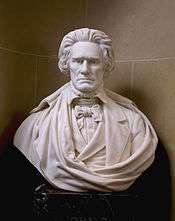
John C. Calhoun
Senate
- President: John C. Calhoun (J), resigned December 28, 1832; thereafter vacant.
- President pro tempore: Samuel Smith (J), first elected December 5, 1831
- Littleton W. Tazewell (J), elected July 9, 1832
- Hugh Lawson White (J), elected December 3, 1832
House of Representatives
- Speaker: Andrew Stevenson (J)
Members
This list is arranged by chamber, then by state. Senators are listed in order of seniority, and Representatives are listed by district.
Senate
Senators were elected by the state legislatures every two years, with one-third beginning new six-year terms with each Congress. Preceding the names in the list below are Senate class numbers, which indicate the cycle of their election. In this Congress, Class 1 meant their term ended with this Congress, requiring re-election in 1832; Class 2 meant their term began in the last Congress, requiring re-election in 1834; and Class 3 meant their term began in this Congress, requiring re-election in 1836.
House of Representatives
The names of members of the House of Representatives are preceded by their district numbers.
Changes in membership
The count below reflects changes from the beginning of the first session of this Congress.
Senate
- Replacements: 7
- Jacksonians: no net change
- Anti-Jacksonians: no net change
- Nullifiers: no net change
- Deaths: 0
- Resignations: 7
- Interim appointments: 1
- Total seats with changes: 9
| State (class) |
Vacator | Reason for change | Successor | Date of successor's formal installation |
|---|---|---|---|---|
| Indiana (1) |
Vacant | James Noble had died February 26, 1831, in the previous Congress. Successor appointed August 19, 1831. |
Robert Hanna (AJ) | Installed August 19, 1831 |
| Kentucky (3) |
Vacant | Legislature elected late November 10, 1831. | Henry Clay (AJ) | Installed November 10, 1831 |
| Louisiana (2) |
Edward Livingston (J) | Resigned May 24, 1831 after being appointed U.S. Secretary of State. Successor elected November 15, 1831. |
George A. Waggaman (AJ) | Installed November 15, 1831 |
| Pennsylvania (1) |
Isaac D. Barnard (J) | Resigned December 6, 1831 due to ill health. Successor elected December 13, 1831. |
George M. Dallas (J) | Installed December 13, 1831 |
| Indiana (1) |
Robert Hanna (AJ) | Appointee retired when elected successor qualified. Successor elected January 3, 1832. |
John Tipton (J) | Installed January 3, 1832 |
| Mississippi (1) |
Powhatan Ellis (J) | Resigned July 16, 1832 after being appointed U.S. District Judge. Successor appointed November 12, 1832 to finish the term. |
John Black (J) | Installed November 12, 1832 |
| Virginia (2) |
Littleton Waller Tazewell (J) | Resigned July 16, 1832. Successor elected December 10, 1832. |
William C. Rives (J) | Installed December 10, 1832 |
| South Carolina (2) |
Robert Y. Hayne (N) | Resigned December 13, 1832 to become Governor of South Carolina. Successor elected December 29, 1832. |
John C. Calhoun (N) | Installed December 29, 1832 |
| New York (3) |
William L. Marcy (J) | Resigned January 1, 1833 after becoming Governor of New York. Successor elected January 14, 1833. |
Silas Wright (J) | Installed January 4, 1833 |
| South Carolina (3) |
Stephen D. Miller (N) | Resigned March 2, 1833 due to ill health. | Vacant | Not filled this term |
House of Representatives
- replacements: 9
- Jacksonians: 1-seat net gain
- Anti-Jacksonians: 2-seat net loss
- Anti-Masonics: 1-seat net gain
- deaths: 8
- resignations: 2
- contested election: 0
- Total seats with changes: 11
| District | Vacator | Reason for change | Successor | Date successor seated |
|---|---|---|---|---|
| North Carolina 2nd |
Vacant | Vacancy in term | John Branch (J) | Seated May 12, 1831 |
| Georgia At-large |
Wilson Lumpkin (J) | Resigned some time in 1831 before the convening of Congress | Augustin S. Clayton (J) | Seated January 21, 1832 |
| Vermont 2nd |
Rollin C. Mallary (AJ) | Died April 15, 1831 | William Slade (AM) | Seated November 1, 1831 |
| Missouri AL |
Spencer D. Pettis (AJ) | Died August 28, 1831 | William H. Ashley (AJ) | Seated October 31, 1831 |
| Pennsylvania 11th |
William Ramsey (J) | Died September 29, 1831 | Robert McCoy (J) | Seated November 22, 1831 |
| North Carolina 6th |
Robert Potter (J) | Resigned November ????, 1831 | Micajah T. Hawkins (J) | Seated December 15, 1831 |
| Vermont 1st |
Jonathan Hunt (AJ) | Died May 15, 1832 | Hiland Hall (AJ) | Seated January 1, 1833 |
| Virginia 22nd |
Charles C. Johnston (J) | Died June 17, 1832 | Joseph Draper (J) | Seated December 6, 1832 |
| Maryland 6th |
George E. Mitchell (J) | Died June 28, 1832 | Charles S. Sewall (J) | Seated October 1, 1832 |
| Virginia 18th |
Philip Doddridge (AJ) | Died November 19, 1832 | Joseph Johnson (J) | Seated January 21, 1833 |
| New York 1st |
James Lent (J) | Died February 22, 1833 | Vacant | Not filled this Congress |
Committees
Lists of committees and their party leaders.
Senate
- Agriculture
- Audit and Control the Contingent Expenses of the Senate
- Claims
- Commerce
- Distributing Public Revenue Among the States (Select)
- District of Columbia
- Finance
- Foreign Relations
- French Spoilations (Select)
- Indian Affairs
- Judiciary
- Manufactures
- Memorial of the Bank of the United States (Select)
- Mileage of Members of Congress (Select)
- Military Affairs
- Militia
- Naval Affairs
- Ohio-Michigan Boundary (Select)
- Pensions
- Post Office and Post Roads
- Private Land Claims
- Public Lands
- Revolutionary Claims
- Roads and Canals
- Tariff Bill (Select)
- Tariff Regulation (Select)
- Whole
House of Representatives
- Accounts
- Agriculture
- American Colonization Society (Select)
- Asylum for the Blind (Select)
- Bank of the United States (Select)
- Biennial Register (Select)
- British Depredations of the Northern Frontier (Select)
- Claims
- Commerce
- District of Columbia
- Elections
- Establishing an Assay Office in the Gold Region (Select)
- Expenditures in the Navy Department
- Expenditures in the Post Office Department
- Expenditures in the State Department
- Expenditures in the Treasury Department
- Expenditures in the War Department
- Expenditures on Public Buildings
- Foreign Affairs
- Indian Affairs
- Invalid Pensions
- Manufactures
- Military Affairs
- Naval Affairs
- Post Office and Post Roads
- Public Expenditures
- Public Lands
- Revisal and Unfinished Business
- Revolutionary Claims
- Roads and Canals
- Rules (Select)
- Standards of Official Conduct
- Territories
- Ways and Means
- Whole
Joint committees
- Code of Laws for the District of Columbia
- Enrolled Bills
Employees
Senate
- Chaplain: John P. Durbin (Methodist), elected December 19, 1831
- Charles C. Pise (Roman Catholic), elected December 11, 1832
- Secretary: Walter Lowrie
- Sergeant at Arms: Mountjoy Bayly
House of Representatives
- Chaplain: Reuben Post (Presbyterian) elected December 5, 1831
- William Hammett (Presbyterian), elected December 3, 1832
- Clerk: Matthew St. Clair Clarke
- Doorkeeper: Overton Carr, elected December 5, 1831
- Sergeant at Arms: John O. Dunn
See also
- United States elections, 1830 (elections leading to this Congress)
- United States elections, 1832 (elections during this Congress, leading to the next Congress)
References
- Martis, Kenneth C. (1989). The Historical Atlas of Political Parties in the United States Congress. New York: Macmillan Publishing Company.
- Martis, Kenneth C. (1982). The Historical Atlas of United States Congressional Districts. New York: Macmillan Publishing Company.
External links
- Statutes at Large, 1789-1875
- Senate Journal, First Forty-three Sessions of Congress
- House Journal, First Forty-three Sessions of Congress
- Biographical Directory of the U.S. Congress
- U.S. House of Representatives: House History
- U.S. Senate: Statistics and Lists
